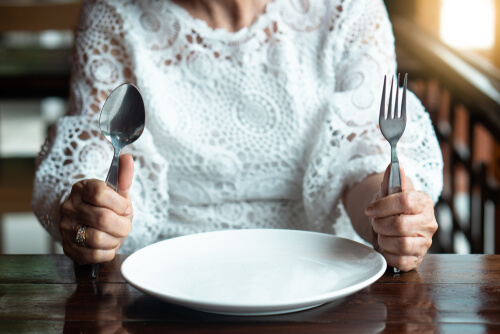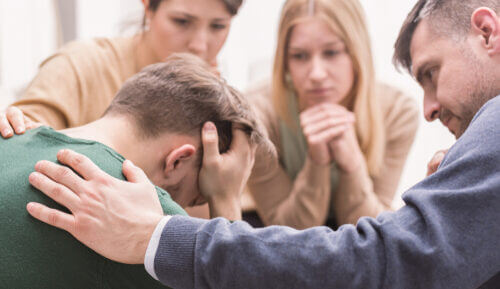
Page contents
It’s natural for older people to lose their appetites to an extent. Health problems and less exercise can be physical causes for this, while many find preparing proper meals unappealing if they are living alone.
Lack of routine in retirement, not wanting to cook for one or having relied on a now deceased partner to do the cooking can all make maintaining a balanced, healthy diet difficult. But when does a changed relationship with food become an eating disorder?
An eating disorder is a mental health condition that affects a person’s relationship with food. According to statistics gathered by NHS Digital, there were almost 30,000 admissions to NHS hospitals for conditions linked to anorexia and bulimia in 2023.
Eating disorders are most common in teenage girls, not helped by the modern onslaught of social media and filters that entice girls to strive for a perceived (and largely fake) image of perfection. But eating disorders have been around for a very long time and can affect people of any age, gender or race.
Jess Griffiths, Clinical Lead at Beat, says: “Certainly there are increasing numbers of people of older age who are being diagnosed and more research into it.”
Eating disorder charity Beat estimates that around 1.25 million people in the UK live with an eating disorder.
What can trigger eating disorders in older people?
For older people, eating disorders are less likely to be about the way they look, and more motivated by emotional factors.
Ms Griffiths says: “For those who develop eating disorders in later life, bereavement seems to be a key aspect in that. Health professionals around them are often quite slow to pick up on that it’s an eating disorder and not grief.
“We also seen that identity reasons can be a trigger. If you’ve been a mum and your children have grown up and left home, or you have retired from a career you enjoyed, that crisis of identity can absolutely impact. Any major transition in life can kick start an eating disorder.
“Over the spectrum of life people use food as a means of communicating. Older people do use food as a means of communicating how they feel. It purveys more areas of life than people realise. Elderly people are losing control of lots of different things in their life, physical, capability, maybe feeling more isolated. It’s an area of training in care, moving forwards.”
Older people can be more concerned about their health than younger people, with age and lifestyle-related diseases becoming a worry. This can sometimes be a trigger for orthorexia nervosa, an unhealthy obsession with healthy eating.
Ms Griffiths explains: “If you’ve got an obsessive personality, as people with eating disorders can do, they will latch onto certain things like gluten intolerance or veganism. The dietary restrictions can become a focus, an obsession, rather than dealing with the health anxiety underneath it.
“If you’ve got these precursors to being vulnerable to eating disorders then this can set off the obsession combined with another emotional factor. It’s never just a diet that does it, there’s always an underlying issue. All these things come together and the trigger might have stayed underground into their 60s but it just happens to be that all those things come together with maybe an illness even, like a cancer diagnosis. Anything where you’re out of control can set an eating disorder off.”
When does a person’s relationship with food become an eating disorder?
Many people follow diets or have preferences about food that some may find strange, but they don’t necessarily have an eating disorder.
A change in eating habits could be a side effect of a physical illness or even another mental health problem, like depression.
Ms Griffiths elaborates: “Older people turn to food for comfort like we all do and it’s one of the only pleasures left in life. Whether that becomes an eating disorder is a tricky one, that overlap between emotional eating and an eating disorder, but I do think sometimes it veers into binge eating.
“Also, that interaction between depression and how you can have a loss of appetite when you’re depressed versus eating disorder, it’s quite difficult to diagnose and tell the difference between the two.”
Symptoms of an eating disorder include:
- Developing a deep interest in food that could be considered obsessive.
- Becoming very sensitive about topics related to their eating. They may enjoy the subject of food but are secretive about their own eating. For example, they may enjoy cooking and baking excessively for their loved ones but never eat what they’ve made themselves, or sit down to a healthy meal around the table then binge on junk food in private.
- Having reasons why they don’t eat the way they used to that you suspect aren’t true. An example might be they never want to join you for meals when they visit anymore and might always say they’ve just eaten. Or they may say they can’t eat certain foods because these foods make them ill, despite them never having had this problem previously.
- Developing strict rules and rituals around food, such as not eating before certain times, always eating from a certain plate or denying themselves food before they’ve “earned” it through exercise or other work. People with eating disorders often have a set of foods they feel safe eating and stick to those.
- Dramatic weight loss is certainly a sign but only 10-15% of people with eating disorders are classed as underweight. Dramatic weight gain can also be a sign.
- An extremely negative view about the way they look, not just their weight.
- Over-exercising or insisting on doing a daily exercise routine without fail, even if it gets in the way of sleep or social commitments.
- Mood swings or becoming withdrawn and unsociable.
- Difficulty sleeping despite being very tired a lot of the time.
- Losing hair. If they are underweight they may also grow downy hair all over their body as the body tries to keep warm. People who are not eating properly are often cold all the time.
- Results from blood tests revealing issues like a low thyroid, low blood cell count or vitamin deficiencies.
- Dental problems such as tooth decay or easily-chipped teeth.
If you or someone you know shows symptoms of an eating disorder, it’s worth seeking advice from a GP.
Getting help
It can be more difficult for an older person with an eating disorder to seek help. Mental illness was a taboo subject in the past and older people can still be troubled by this stigma, despite it being a widely discussed and accepted topic today.
They may also lack motivation to get better. Ms Griffiths says: “What we use as motivators for change in younger people don’t always apply for older people. Quite often we’ll use those physical side effects to say well you might get your periods back, you might get your fertility impacted, and use those as motivators for change. But with older people, especially if they’ve been bereaved, you have to process that loss. Obviously the deceased loved one is not going to return, regardless of whether the person recovers from their eating disorder or not.”
There is a lot of support available for people of any age with eating disorders. Your GP can refer to you to specialist teams, while organisations like Beat offer great expert and peer support. They have ambassadors who use their experience of recovery to help others. It is a myth that people never fully recover from eating disorders, full recovery is possible at any age, as Ms Griffiths explains: “One of our ambassadors, Jenny, she finally cracked her recovery in her 60s.
“I would encourage anyone of any age to reach out for support, it’s never too late to recover. It’s always possible and we would always encourage anyone at any stage of life to feel worthy of treatment and to reach out for support.”
| Beat helpline | 0808 801 0677 Open 9am – 8pm on weekdays and 4pm – 8pm at weekends and on Bank Holidays |
Coping as a family member or friend of an older person with an eating disorder
It isn’t easy to see a loved one struggle with an eating disorder. Much of the support available is aimed at parents of teenagers but having a parent or spouse with an eating disorder can be a very different experience. Not having parental authority over the person can make you feel helpless or even like your attempts to help are intrusive. Being in a caring role to a parent, losing that nurturing figure in your life as the roles reverse, is hard, especially when you know they lie to you all the time or regularly put their dietary restrictions before you in their priorities.
It’s very easy to be angry in situations like this, particularly if your loved one is in denial or refuses to get help. In the UK, unless someone is eligible for sectioning, they cannot be forced to seek professional help with mental health issues.
Ms Griffiths explains: “In terms of carer support, that’s friends and family, we very much encourage that a carer of any capacity gets the skills that are needed to be able to support someone with an eating disorder, we know that helps in recovery. Particularly through Beat but through NHS services we run carer skills training days. Ours is called Developing Dolphins and there’s a book that goes alongside it. You have a bit of a crash course in eating disorders and we teach you communication skills.
“We know the kind of underlying causes of eating disorders. People are quite sensitive and they shut down quite easily if you don’t approach them with caution. We talk through communication skills and practise those skills of how to communicate with someone with an eating disorder, be that with a parent, with a sibling, whoever. There’s a good research base behind it and it really helps the person to recover, helps them realise they need to change.
“Even if the person hasn’t engaged in treatment, the carer should be able to access support from the eating disorder service. If anyone’s ever concerned about an older parent with an eating disorder they can get in touch with their GP and also they could ring the specialist eating disorder service and talk to them about it and raise concerns.”


